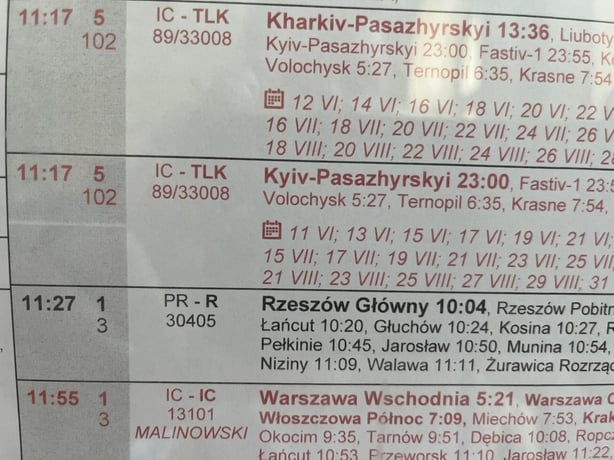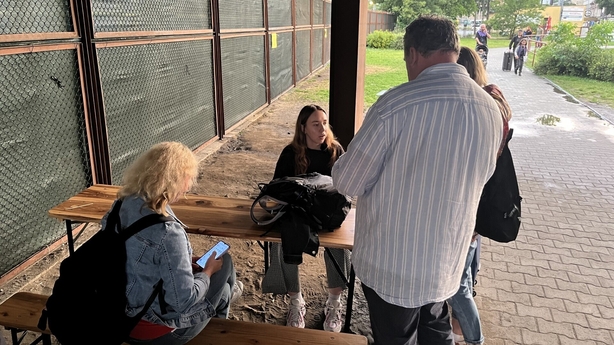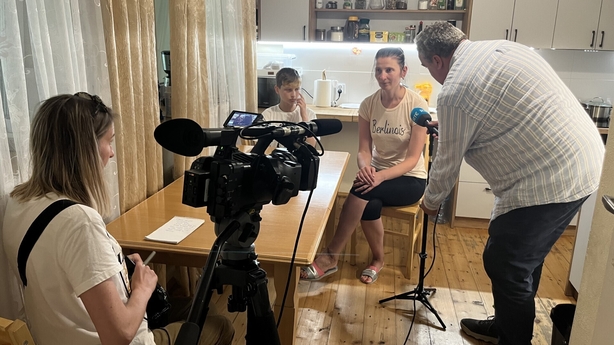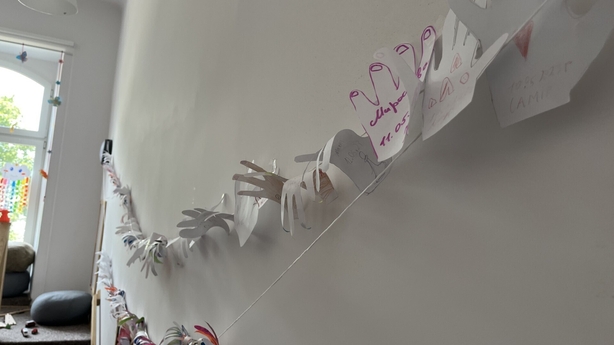Political Correspondent Paul Cunningham revisits the Polish border town of Przemysl, which received vast numbers of refugees in the aftermath of the Russian invasion of Ukraine nearly a year and a half ago.
On a dark night in March last year, with temperatures having plummeted to well below zero, I spotted a boy in distress outside Przemysl train station.
I spun around after I heard his piercing scream.
It was high-pitched, maybe more of a shriek, one of those human sounds that makes you pivot speedily to make sure that everything is okay.
The boy was no more than five years old. He was trying to pull away from what seemed to be his mother and siblings.
The group was part of a short queue making its way towards one of the many minibuses parked outside the station.
Each dashboard displayed a sign indicating which city in Poland the newly arrived refugees would be dispersed to.
But the little boy had had enough.
As I glanced, my stomach turned. I thought that the little fellow should be tucked up in bed with his favourite cuddly toy and dreaming about playing with his friends at school in the morning.
Instead, he was in a state of distress on the freezing street of a foreign country at 10pm.
Everything he'd known in life had been up ended. For a moment, the boy relented - probably only due to exhaustion.
And as he stood under the bright streetlight, I noticed that his little hands were pink from the cold.
I turned away, as he was cajoled to get on the minibus and shortly afterwards, the family disappeared into the night to who knows where.
This was the immediate aftermath of the Russian invasion of Ukraine and 100,000 refugees per day were spilling into Poland.
The UN was warning that 1.5 million people could be on the move inside Ukraine and that a humanitarian disaster of unimaginable proportions was unfolding.

At some border posts, like Medyka near Przemysl, the refugees would emerge in groups rather than a constant flow.
Every few minutes, a bedraggled group of 20 or 30 people would pass through the gates on foot and walk by the world's media, carrying their worldly belongings in assorted luggage and plastic bags.
Poland, to its eternal credit, quickly whisked most of them away to transfer stations.
The overwhelming number were women and children.
There, they were provided with mobile phone SIM cards and food, before being offered free bus or rail transport to anywhere in the EU.
When I returned this week to Przemysl, nearly a year and a half after the conflict began, the refugee dynamic had changed completely.
Medyka border crossing was quiet, except for trucks bringing supplies into Ukraine. The refugee transfer station had been closed.
With a vastly reduced number of incoming refugees, different NGOs had stepped in to provide accommodation, as well as provide access to badly needed doctors and psychiatrists.
"People are suffering very much. I don't wish anybody to go through it"
Yet the bottom line remained the same - the lives of Ukrainians had been torn apart by the Russian invasion and ongoing aggression.
Cameraman Mark Ronaghan and I visited the Ukrainian House project which is run by Ukrainians and provides 50 beds to newly arrived refugees, who have 48 hours to decide on their future travel plans.
However, this can be extended if things don't work out.
Nina Mykolaivna, a 77-year-old, was sitting on a bunk bed when we arrived, as she finalised her preparations to leave for Austria.
It only took a few words from Nina, along with the quiver in her voice, to know that she was traumatised by war which had engulfed her town, close to the port city of Odesa.
She said: "It is very difficult psychologically. Constant sirens. When the rockets are flying - the shaheed [drones] - it is unbelievable."
"People are suffering very much. I don't wish anybody to go through it. Anybody," she added.
Nina explained that the desire to see her granddaughter in Vienna had finally compelled her to leave her beloved home.

Catholic groups are also attempting to help.
One of them is called the Pastoral Family Care Foundation and its main objective is to try and protect refugee children from further trauma.
Funded by donations, it provides mini apartments for families rather than allowing them to stay in large communal centres.
Fr Marek Machała told me about how he tries to convince refugees under his care to think of an "active future," rather than dwelling on the horror of their loss.
He urges them to continue with their education or wills them to try and secure a job in order to reclaim at least some of their independence.
Yet older people find that challenge difficult to achieve, if not impossible.
One of the refugees staying with Fr Marek was 66-year-old Olena Kuzakhove.
She left her frontline home in the eastern Donetsk region due to the war, but the Russian forces then shelled the Ukrainian town she had taken shelter in.
For Olena, the future was monochrome and she wanted to return home.
"I'm waiting so that I can go back. I have a relative there. I have a father, mother, and husband in the cemetery. This isn't something insignificant to me," she said.
Olena looked drawn and spoke with a low sad voice. She seemed beaten down by the unfamiliarity which refugees face every day.

Eugenia Zhenia related to us how she fled the Russian-controlled district of Kherson, with her son Matvii, in a dramatic escape through multiple checkpoints.
The 13-year-old was thriving at a local school now, in part because he knew Poland was peaceful.
He said: "Here you don't need to be afraid that something could happen - some rocket landing. Here you feel safer, although you are worried for your relatives who are staying there [in Ukraine]."
Eugenia was trying to face up to the brutal realities of her new life.
She said: "We would like to go back home… very much to our home. .. to touch each trinket there... but I realise that we don't have a place to go back to."
At the end of our assignment, we returned to Przemsyl train station where I'd spotted the distraught boy at the beginning of the war.
There was a queue forming at platform 5. The people prepared to disregard the risks and return to a war-torn Ukraine.
Mark and I spoke to a dozen of the intending passengers, with the help of our talented translator Vladyslava, a Ukrainian who studied in the eastern city of Kharkiv but moved to Poland long before the conflict.
Most of those waiting for the train to Kyiv were only going to go back for a week or two, but others told us that safety in exile was too high a price to pay.

Kateryna was one. She'd been living in Spain, with her two children but found the separation too difficult.
She said: "They are 10 and 12 years. They were missing their Dad; their home; dogs; and the grandma and grandad. It was very very hard."
Kateryna's train was the last one to leave Przemysl that day, with her two kids, but more refugee children would arrive very early the following morning.
At the Ukrainian House project, the children had a playroom which featured a very special piece of artwork.
Every child who attended the shelter traced their hand on paper, cut it out, wrote down the date and their name before decorating it.
Each hand was then laced onto a paper chain which ran the length of the playroom.
They were about to create their third chain, a visual representation of forced migration in which Ukrainian children continue to wave goodbye to their homes, happiness and innocence.






